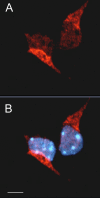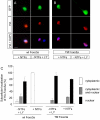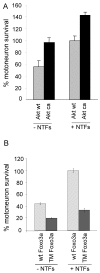Foxo3a induces motoneuron death through the Fas pathway in cooperation with JNK
- PMID: 15569384
- PMCID: PMC538283
- DOI: 10.1186/1471-2202-5-48
Foxo3a induces motoneuron death through the Fas pathway in cooperation with JNK
Abstract
Background: Programmed cell death of motoneurons in the developing spinal cord is thought to be regulated through the availability of target-derived neurotrophic factors. When deprived of trophic support, embryonic spinal motoneurons in vitro over-express FasL, a ligand activating a Fas-mediated death pathway. How trophic factors regulate the expression of FasL is presently unclear, but two regulators of FasL, FOXO3a (FKHRL1) and JNK have been described to play a role in other cell types. Thus, their potential function in motoneurons was investigated in this study.
Results: We show here that as a result of removal of neurotrophic factors and the consequent reduction in signalling through the PI3K/Akt pathway, Foxo3a translocates from the cytoplasm to the nucleus where it triggers cell death. Death is reduced in Fas and FasL mutant motoneurons and in the presence of JNK inhibitors indicating that a significant part of it requires activation of the Fas/FasL pathway through JNK.
Conclusions: Therefore, in motoneurons as in other cell types, FOXO transcriptional regulators provide an important link between other signalling pathways and the cell death machinery.
Figures





References
-
- Hamburger V. Cell death in the development of the lateral motor column of the chick embryo. J Comp Neurol. 1975;160:535–546. - PubMed
-
- Bloch-Gallego E, Huchet M, el M'Hamdi H, Xie FK, Tanaka H, Henderson CE. Survival in vitro of motoneurons identified or purified by novel antibody-based methods is selectively enhanced by muscle-derived factors. Development. 1991;111:221–232. - PubMed
Publication types
MeSH terms
Substances
LinkOut - more resources
Full Text Sources
Molecular Biology Databases
Research Materials
Miscellaneous

